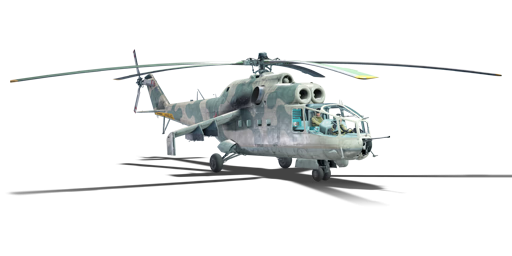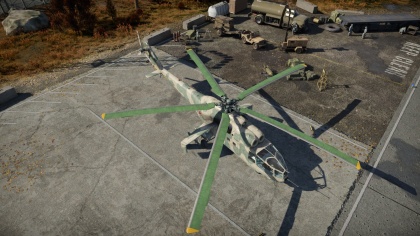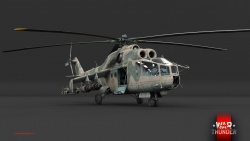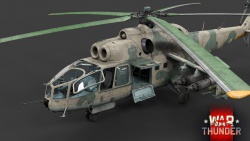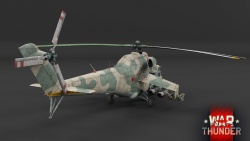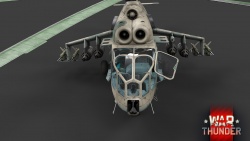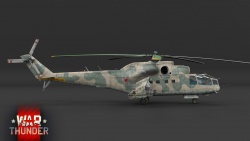Mi-24A
Contents
| This page is about the Russian attack helicopter Mi-24A. For other uses, see Mi-24 (Family). |
Description
The Mi-24A is a Rank V Russian attack helicopter
with a battle rating of 9.3 (AB), 8.7 (RB), and 9.0 (SB). This helicopter was introduced in Update 1.81 "The Valkyries".
General info
Flight Performance
Describe how the aircraft behaves in the air. Maximum speed, manoeuvrability, speed and allowable loads - these are the most important characteristics of the vehicle.
| Characteristics | |||
|---|---|---|---|
| Stock | |||
| Max Speed (km/h at ?,000 m) |
Max altitude (meters) | ||
| AB | RB | ||
| ? | ? | 4950 | |
| Upgraded | |||
| Max Speed (km/h at ?,000 m) |
Max altitude (meters) | ||
| AB | RB | ||
| ? | ? | 4950 | |
Survivability and armour
Examine the survivability of the helicopter. Note how vulnerable the structure is and how secure the pilot is, how many engines the vehicle has. Describe the armour, if there is any, also mention the vulnerability of other critical aircraft systems.
Armaments
Offensive armament
Describe the offensive armament of the aircraft, if any. Describe how effective the cannons and machine guns are in a battle, and also what belts or drums are better to use. If there is no offensive weaponry, delete this subsection.
Suspended armament
Describe the aircraft's suspended armament: additional cannons under the wings, bombs, rockets and torpedoes. This section is especially important for bombers and attackers. If there is no suspended weaponry remove this subsection.
Usage in battles
Describe the tactics of playing in the helicopter, the features of using vehicles in a team and advice on tactics. Refrain from creating a "guide" - do not impose a single point of view but give the reader food for thought. Examine the most dangerous enemies and give recommendations on fighting them. If necessary, note the specifics of the game in different modes (AB, RB, SB).
Modules
| Tier | Flight performance | Survivability | Weaponry | |||
|---|---|---|---|---|---|---|
| I | Compressor | Flak jacket | Offensive 12 mm | |||
| II | Helicopter frame | FAB-250 | 2P32M/K-4V | |||
| III | Engine | Replacing helicopter blades | New 12 mm MGs | FAB-500 | ||
| IV | Cover | |||||
Pros and cons
Summarize and briefly evaluate the vehicle in terms of its characteristics and combat effectiveness. Mark its pros and cons in the bulleted list. Try not to use more than 6 points for each of the characteristics. Avoid using categorical definitions such as "bad", "good" and the like - they have a substitution in the form of softer "inadequate", "effective".
Pros:
Cons:
History
In studying the possibilities of helicopter design and the experience of other countries, Mikhail Leontyevich Mil came to the conclusion that a well-armed and armored battle helicopter was required to increase the mobility of the Soviet Army. It had to be capable of transporting cargos and paratroopers – a kind of flying armored car. In contrast to the American army, in which troop transport helicopters operated with cover from assault helicopters, Mikhail decided to create a vehicle that could handle both these tasks on its own. The engineers at the Mil design bureau already had considerable experience in developing helicopters, and had performed several experiments in transforming transport helicopters into assault helicopters. This meant that after military officials approved the concept of an assault-transport helicopter, the team immediately got to work. In the summer of 1969, literally a year after the work had begun, the Mil engineers presented a prototype for testing.
The first version of the Mi-24 already had the characteristics and features familiar to all fans of military vehicles found in the later series-produced versions, the Mi-24B and the Mi-24D. The characteristic silhouette for which the Mi-24 was dubbed “Hind”, two TVZ-117 turboshaft engines, retractable landing gear, a cargo bay for paratroopers and wings for mounting weaponry. However, there were differences also. The tail rotor on the Mi-24A was placed on the right – it was only moved to the left side in 1974. A single cabin was mounted on the Mi-24A with a flat glass, a so-called “Veranda” in which the armament operator and the pilot could sit one behind the other with a slight offset. The main difference was the armament. By the time the Mi-24 was created, the weaponry that the military demanded for the new helicopter – modern Shturm ATGMs with an advanced aiming kit, and a rapid-firing machine gun for the rotating nose turret – was not yet ready. The first versions of the Mi-24 were equipped with the Falanga-MV ATGM with manual aiming, the single-barrel A-12.7 in a turret with limited mobility on the nose with a simple collimator sight, and unguided rockets or up to 1000 kg of bombs on the wing hardpoints. Officially, the Mi-24A was never accepted into service, although quite a lot of the vehicles were built – along with the training versions, over 240 in total. The Mi-24A was exported, and took part in military operations in Ethiopia, Afghanistan and Libya.
- From Devblog
Media
- Images
See also
Links to the articles on the War Thunder Wiki that you think will be useful for the reader, for example:
- reference to the series of the aircraft;
- links to approximate analogues of other nations and research trees.
External links
| USSR helicopters | |
|---|---|
| Attack | |
| Hound | Mi-4AV |
| Hip | Mi-8AMTSh · Mi-8TV |
| Hind | Mi-24A · ▂Mi-24D · Mi-24P · Mi-24V · Mi-35M |
| Havoc | Mi-28N · Mi-28NM |
| Helix | Ka-29 |
| Hokum | Ka-50 · Ka-52 |


